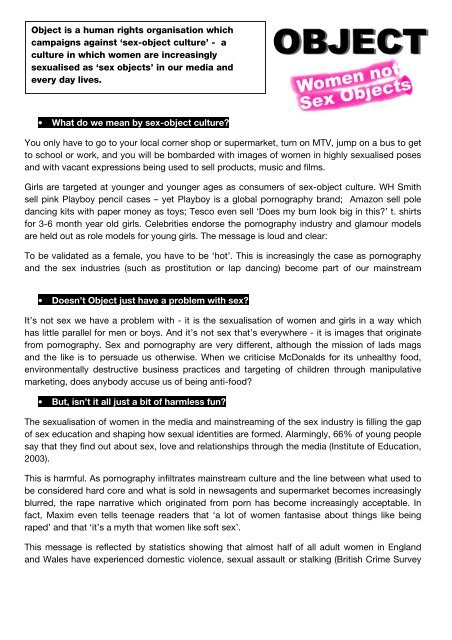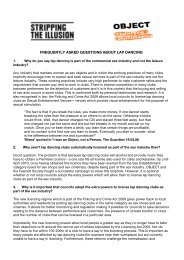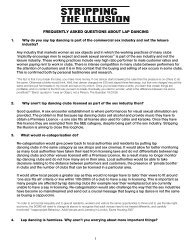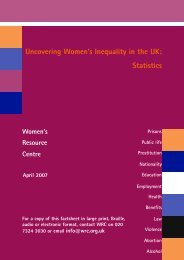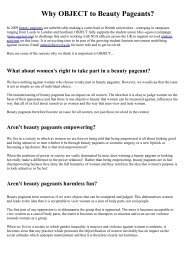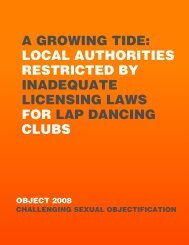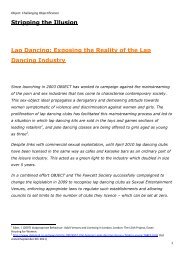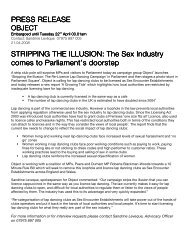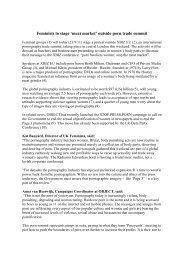⢠What do we mean by sex-object culture? You only have to go to ...
⢠What do we mean by sex-object culture? You only have to go to ...
⢠What do we mean by sex-object culture? You only have to go to ...
Create successful ePaper yourself
Turn your PDF publications into a flip-book with our unique Google optimized e-Paper software.
Object is a human rights organisation which<br />
campaigns against ‘<strong>sex</strong>-<strong>object</strong> <strong>culture</strong>’ - a<br />
<strong>culture</strong> in which women are increasingly<br />
<strong>sex</strong>ualised as ‘<strong>sex</strong> <strong>object</strong>s’ in our media and<br />
every day lives.<br />
• <strong>What</strong> <strong>do</strong> <strong>we</strong> <strong>mean</strong> <strong>by</strong> <strong>sex</strong>-<strong>object</strong> <strong>culture</strong>?<br />
<strong>You</strong> <strong>only</strong> <strong>have</strong> <strong>to</strong> <strong>go</strong> <strong>to</strong> your local corner shop or supermarket, turn on MTV, jump on a bus <strong>to</strong> get<br />
<strong>to</strong> school or work, and you will be bombarded with images of women in highly <strong>sex</strong>ualised poses<br />
and with vacant expressions being used <strong>to</strong> sell products, music and films.<br />
Girls are targeted at younger and younger ages as consumers of <strong>sex</strong>-<strong>object</strong> <strong>culture</strong>. WH Smith<br />
sell pink Playboy pencil cases – yet Playboy is a global pornography brand; Amazon sell pole<br />
dancing kits with paper money as <strong>to</strong>ys; Tesco even sell ‘Does my bum look big in this?’ t. shirts<br />
for 3-6 month year old girls. Celebrities en<strong>do</strong>rse the pornography industry and glamour models<br />
are held out as role models for young girls. The message is loud and clear:<br />
To be validated as a female, you <strong>have</strong> <strong>to</strong> be ‘hot’. This is increasingly the case as pornography<br />
and the <strong>sex</strong> industries (such as prostitution or lap dancing) become part of our mainstream<br />
<strong>culture</strong> and everyday lives.<br />
• Doesn’t Object just <strong>have</strong> a problem with <strong>sex</strong>?<br />
It’s not <strong>sex</strong> <strong>we</strong> <strong>have</strong> a problem with - it is the <strong>sex</strong>ualisation of women and girls in a way which<br />
has little parallel for men or boys. And it’s not <strong>sex</strong> that’s everywhere - it is images that originate<br />
from pornography. Sex and pornography are very different, although the mission of lads mags<br />
and the like is <strong>to</strong> persuade us otherwise. When <strong>we</strong> criticise McDonalds for its unhealthy food,<br />
environmentally destructive business practices and targeting of children through manipulative<br />
marketing, <strong>do</strong>es anybody accuse us of being anti-food?<br />
• But, isn’t it all just a bit of harmless fun?<br />
The <strong>sex</strong>ualisation of women in the media and mainstreaming of the <strong>sex</strong> industry is filling the gap<br />
of <strong>sex</strong> education and shaping how <strong>sex</strong>ual identities are formed. Alarmingly, 66% of young people<br />
say that they find out about <strong>sex</strong>, love and relationships through the media (Institute of Education,<br />
2003).<br />
This is harmful. As pornography infiltrates mainstream <strong>culture</strong> and the line bet<strong>we</strong>en what used <strong>to</strong><br />
be considered hard core and what is sold in newsagents and supermarket becomes increasingly<br />
blurred, the rape narrative which originated from porn has become increasingly acceptable. In<br />
fact, Maxim even tells teenage readers that ‘a lot of women fantasise about things like being<br />
raped’ and that ‘it’s a myth that women like soft <strong>sex</strong>’.<br />
This message is reflected <strong>by</strong> statistics showing that almost half of all adult women in England<br />
and Wales <strong>have</strong> experienced <strong>do</strong>mestic violence, <strong>sex</strong>ual assault or stalking (British Crime Survey
2004) and a high proportion of people still think that women are at least partially <strong>to</strong> blame for<br />
rape, with rape conviction rates at an all time low (Amnesty International, 2005).<br />
‘Sex-<strong>object</strong> <strong>culture</strong>’ also harms boys who are pressurised <strong>to</strong> act out a version of ‘being a man’ in<br />
which po<strong>we</strong>r over women is normal. The effect is demonstrated <strong>by</strong> the fact that <strong>only</strong> 8% of rapes<br />
are stranger rapes, <strong>mean</strong>ing that it is ‘ordinary’ boys and men who are committing <strong>sex</strong>ually<br />
violent crimes. The media’s portrayal of women as <strong>sex</strong> <strong>object</strong>s also harms girls’ mental and<br />
physical health leading <strong>to</strong> a lack of confidence with their bodies as <strong>we</strong>ll as eating disorders<br />
(American Psychological Association, 2007). Women and girls are comparing themselves with<br />
celebrities who <strong>have</strong> had plastic surgery and whose pho<strong>to</strong>graphs <strong>have</strong> been airbrushed. It is no<br />
wonder that in the UK at least 1 million people <strong>have</strong> eating disorders (90% of whom are women)<br />
and that upwards of £1 billion pounds is spent on plastic surgery annually (90% of which is spent<br />
<strong>by</strong> women).<br />
When women are overwhelmingly valued on the basis of their looks this has an impact on all<br />
spheres of life. Parliament is 80% male, and the gender pay gap <strong>mean</strong>s that in effect women are<br />
<strong>only</strong> paid till Oc<strong>to</strong>ber whilst men continue <strong>to</strong> be paid until the end of the year.<br />
• But what if it’s a woman’s choice <strong>to</strong> be glamour models or lap dancers?<br />
Mainstream media outlets glamorise the ‘porn star’ life. For example even though much research<br />
shows that prostitution is overwhelming abusive and exploitative, the media friendly s<strong>to</strong>ry is still<br />
one of the ‘Belle du Jour’ fantasy of a successful and glamorous call girl. Instead of showing the<br />
realities of lap dancing, page 3 or prostitution, the media focuses on discussions on women’s<br />
choice <strong>to</strong> participate in the <strong>sex</strong> industry.<br />
Actually, the issue of choice is complex. We <strong>have</strong> <strong>to</strong> look at all the fac<strong>to</strong>rs which influence our<br />
choices, including the way that the media and popular <strong>culture</strong> glamorises the <strong>sex</strong> industry. Even<br />
if <strong>we</strong> could establish that it truly was a genuine and empo<strong>we</strong>ring choice of a woman <strong>to</strong> <strong>go</strong> in<strong>to</strong><br />
one of these industries, the harmful impact that their normalisation has on society makes the<br />
issue much bigger than one of individual choice.<br />
• <strong>What</strong> about free<strong>do</strong>m of speech?<br />
We are talking about multi-billion pound media and <strong>sex</strong> industries backed up <strong>by</strong> big business. It<br />
is clear that it is the <strong>sex</strong> industry and all those making profit out of the <strong>sex</strong>-<strong>object</strong> <strong>culture</strong> that<br />
<strong>have</strong> the loudest voice. It is the women and men who want <strong>to</strong> challenge this <strong>culture</strong> that are<br />
silenced.<br />
We are not calling for censorship. Object is calling for improved regulation of the media in relation<br />
<strong>to</strong> <strong>sex</strong>ism and for people <strong>to</strong> understand the reality and effects of normalising words and images<br />
which reinforce and normalise inequalities bet<strong>we</strong>en women and men. Quite rightly this has been<br />
recognised in the arena of racial equality, where legislation criminalises the incitement of racial<br />
hatred. Isn’t it time for such laws <strong>to</strong> be brought in <strong>to</strong> protect the rights of women?<br />
Want <strong>to</strong> find out how <strong>to</strong> get involved in campaigning and activism? Contact:


